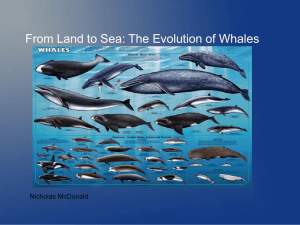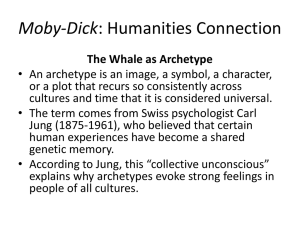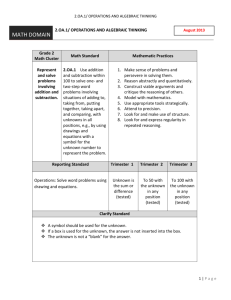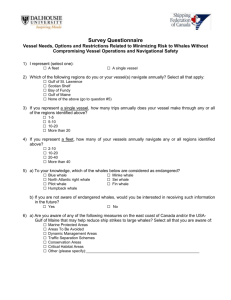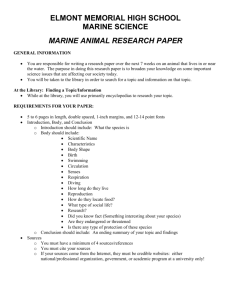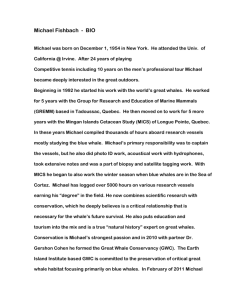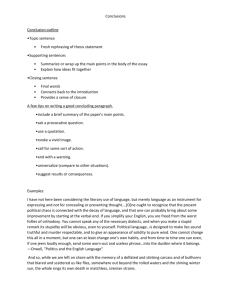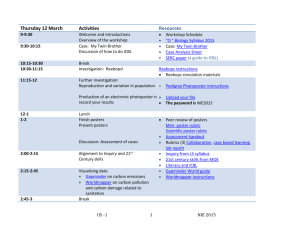Very Like a Whale
advertisement
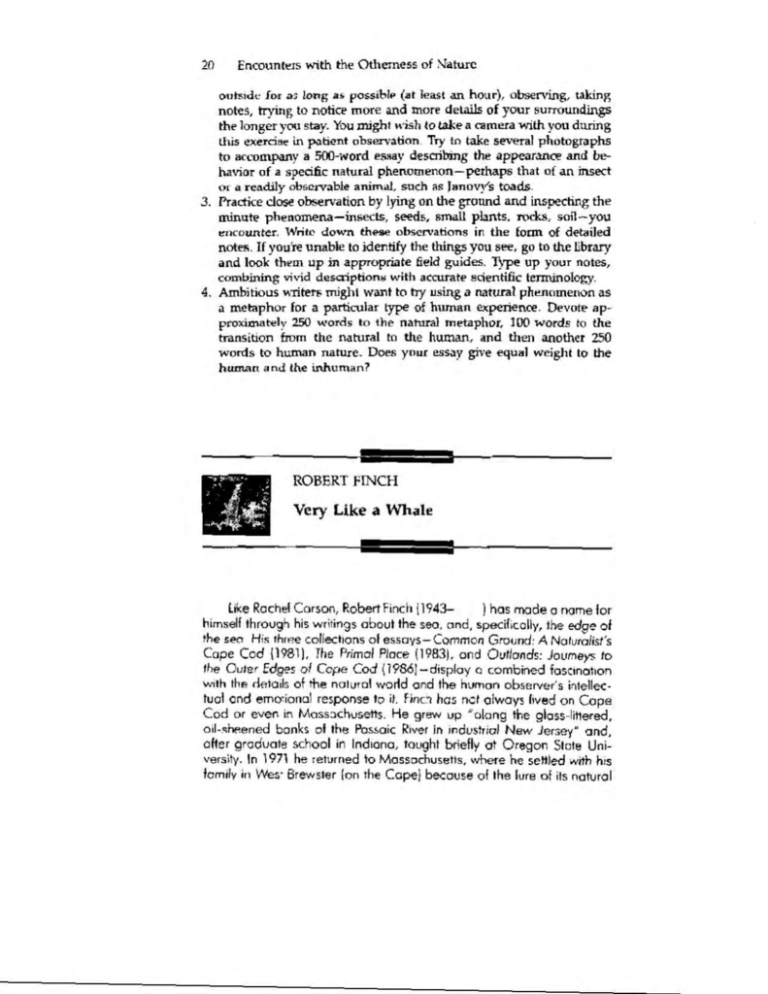
20 Encounttrrs with the Othmness ofXdturc oufs~def o r a; long as yossibl~(at least an hour), obsenkg, taking notes, tr,ing to notice more and more details of your surroundup the long& ym stay. You might wish to take a amrra with you during this exercise in patient observation Try to take several photographs to accompany a 580-word essay desajbmg the appearam and behavior of a specitic natural phertomenon-perhaps that of an insect or a r e a d y obscrvabk animal, such as ]anoyfs toads. 3. Practice dose observation by Iying on the ground and inspechng the minute phenomena-insects, seeds, small plants, rocks, soil -you encounter. Writc down these obscmations in the form of detailed note^. If you'k unabie to identify the things you see, go to the library and look them up in appropriate field guide, me up your notes, combining vivid descriptionti with accurate scientific terminohgy. 4. Ambitious writem might want to try trysing a natural phennmerun as a metaphor for a particular type of human erperience. Devote approximately 250 words to the natural metaphor, 100 words to the tmnsitlon from the natural to t h e human, and then another 250 words to human nature- Does your essay give equal weight to the human and the h u m a n ? ROBERT FINCH Very Like a Whale Like Rachel Carson, Robert Finch 11943) has made a name for himself through his writings about the sea, ond, specif~colly,the edge of the sen His three col/ect~ons of essays- Common Ground: A Naluralist's Cape Cod (1981), The Primal Ploce ( 1 983), and Outlands: J o u r n e ~to fhe Outer Edg~sOI Ccpe Cod ( 19861-display a combined fasclnclt~on w~ththe Cjeta~Isof the natural world and the humon observer's itltellectusl and erno-ional response to it. Finc? has nct always lrvad on Cape Cod or even in Mass3chusetrs. He grew up "along the gloss-littered, all-qkened banks of the Possaic River in ~ndustrrolNew Jersey" and, aher graduate school in Indrona, taught briefly at Oregon Stote University. In 1971 he returned to Massnchusstts, where he senled ~ i t hh ~ s tarnilv in Wes- Brewster [ o n the Cape] because of the lure of its natural landscope and 11s literary trodfiron. Finch currently lives on/)' a short dislance from whets the poet Conrod Aiken once lived, and he purchased tgnd where his house stonds from John Hay, onother contemporary nature writer. Atthough he now devotes most 01 his t~meto writing, Finch has worked as the publ~cutionsdirector jar t h e Cape Cod Museum of Natural History ond hos taught at cape Cod Cornrnunily College and the Bread Loaf Writers' Conference in Vermont. In addiiion to his own books, he co-edited The Norton Book of Nature Wnting I1990). Unlike Carson, Finch's academic background is in the humanities; he was an undergraduate English major ot Harvard. "Most of whuf 1 would call nature writing 1s not done b y scientists or formally trained he says in a n essay cul!ed 'Being at Two with Nature" (19911, "but by wrrters who slip through the back door of the humanities.'' Finch's writing demonstrates bath on understonding of the noturol phenomena he encounters during h ~ swondenngs-by fool or b y bool-on the beaches nnd coastul waters of the Cape and a profound respect for the mysterious otherness of these phenomena, umsimsudbhumdn i ~ _ t ~ n d s P P ~ o whd-lly p r i a ~ de-da-md m m s . In "Very Like o Wtlale," for instonce, he goes s o for as tc soy, 'This sense of otherness is, I feel, as necessary a requirement tu our personaliries as load and warmth are to our bodies." One day last week at sunset 1 went back to C u r p a t i o n Beach in D e m s ta set. what Iraccs, if m y , might be left of the great, dead finback whale that had washed up there several weeks before. The beach was not as hospitable as it had been that sunny Satu~daymorning alter l'hankspving when thousands of us s h a m e d ovet the sand to gaze and look. A few- cars wew parked in thc lot, but these kept thelr habitants Bundled up against a sharp wind, I set off along thc hrclvc-foot swath of trampied beach grass, a raw highway mad^ in a few hnurs by tcn thousand feet that day. I came to the spot where the wl~alehad &ached and rnnn7eled that such a magnitude of flesh could have been therc one da~pand gone the next. But the carcass had been hauled off and thy tide'had smoothed and Licked clean whatever xeshges had remained T h e cold, salt wind had Wed horn the sands the last tracc of that pervasive stench of decay that clung to our clothes fur days, and now blew dean and sharp into my nostrils. The only sign that anything unusual had been there was that the beach was a little too clean, not quite so pebbly and littmcd as the surrounding m a s , as the g m s s above a new grave is always fresher and greener What had so maufestly ompi& h s space a short whde ago was now utterly gone. And yet the whale still lay heavily on mxT mind; a question lingered, Iike a persistent odor m the air. And its dark though now sunken somewhere beneath the waves, stdl loomed before me, beckoning, asking s u m e t h g . U'hat was it? What had we seen? Even the xrleral thousand ofus that managed to get down to the beach before it was dosed off did not see much Whales, dead or &ve, ;ire protected these days under the Fed& Marine Mammals Act, and shortly after we arrivd, iocal police kept anyone from aaually touching the whale. E could hardly regret tl-us, since & the past beached whales, still alive, have had cigarettes put out in their eyes and bits of flesh hacked off with pocket knives by souvenir seekers. And so, kept at a distance, we looked on while the speciahsts worked, whteioated, plastic-gloved autopsists from the New England Aquarium, hadung open the thick h d e with caning knives and plumbing its depths for samples tc~be shpped to Canada for analysis and d e t e h t i o n of causes oj death. What was it they were p u k g out? What mystery would they pluck from that huge coffin of dead flesh?We would have tu trust them for the answer. But as the crowds continued to grow around the whale's body like flies m u n d carrion, the question seemed to me, and stdl seems, not SP S k U W h a t made this dark hulk such a human magnet, spilIing us over onto private b s and fields? I watchcd e l e d c i a n s and oil truck drivers pulling their ve.ehides off the road and clambering down to the beach. Women in high heels and pearls, on their way to Fdcne's, stumbled through the Iwse sand to gaze at a corpse. The normal human pattern was broken and a ramvrat atmosphere was created, appropriate enough in the literal sense of "a farewell to the flesh." Hut there w a s also a sense of pilgrimage in those trekking across the beach. an obligation to view such a thing. But for what? Are we redly such n_oYic~s - to death? Or so &npe, reverent toward ~ t ? I could understand my own semiprofessional interest in the whale, but wlmt had drawn these hordes? There drtr some obvious answers, of course: a break in the dull routine, "somethmg different." An old human desire to associate ourselves with p a t and extraordmary events. W e placed children and sweethearts in front of the corpse and d c k ~ d carncrat;."Ruthie and the whale." "Having a whale of a time on Cape Cod." , . <,dwcn't -- What, after aU, h d we learn by being there? We were more like c W &n at a ZOO, pointing and poking, or Indans on a pristine beah, gazing in innocent wonder at strange European s h y s come ashore. Yet, as the biologists looted it with vials and plastic bags and the press captured it on film, the spectators also tried to make mething of the whale. C m h g arcrund it as though for same hold on its slippery bulk, we grappled it with metaphors, lashed similes around its immense girth. It lay upside down, overturned "like a trailer h c k . " Its Mack s b was cracked and peelmg , red underneath, "like a used ~ e . The " Robert Finch IQty Like J Whale 23 distended, corrugated lower jaw, "a giant accordion," was afloat with the gas of putrifaction and, when pushed, o s d a t e d slowly "like an enormous waterbed." Like our primitive ancestnrs, we still tynd to make i a g e s to try to comprehend the unknown. ~ u what t were we looking at? Or more to the point, -t 't? What did we see in it that might tell i f i n b a c k whale-lhenopiao physaius-d baleen cetacean. The second largest creature ever to live on earth. An ;nteIligent and complex mammal. A cause for conservationists. A rcmarkably adapted swimming and eating machine. Perfume, p d food. =@neering oil. A magrufUcent scientihc specimen. A tourist attraction. A m& event, a "day to remember." A health menace, a "possible carrier of a communicable disease." A municipal headache and a navigational hazard. Materid for an essay. O n the whale's own hide seemed to be written its life history, whl ch we could remark but not read, The right fluke was almost entirely gone, bst in some distant accident or battle and now healed over with a wlute xar. The red eye, unexpededly s m d and mammalian, gazed out at us with fiery blankness. Like the glacial scratches sometimes found on our boulders, there were strange marks or grooves in the s h around the anal area. perhaps caused by scraping the ocean bottom. k t we muld not seem tn scratch its surface. The whale-dead, immobile, in hfl view n rmetheless shrfted kaleidoscopically hefore our eyes. The foUor4ulg morning it was gone, efficiently and sanitarily removed, like thc week's garbage. What was it we saw-? I have a theory, though prohbly (as they say in New England) it hardly dues. There is a tendency these days to defend whales and other endangered animals by pointing out their similarities to human beings. Cetaceans, we are told, are very intelligent. The): possess a highly complex language and h a v ~developed sophisticated communications svstems that transmit over long &stances. They form family groups, devclop social struciures and persona1 relationships, and express loyalty and affecbvn toward nne another. Much of their behavior seems tr) be rerreationd they sing, they play. And so on. These rue not senhmental clams. Whales apparentIy do these things, at least as far as our sketchy information about their lwbits ~ ~ a r r a n tsuch s interpretatic~nu. And f r ~ rmy money, any argument that helps to preserve these ma@cent creatures can't be all bad. U a k e x e p t i o ~ w a cnutbxause h -on%,r a m ~ H t d n & e d e & r ~ d~ ~ l c d mI tg- k-w d u s i u - e n - - & _ . a d d a m n -ruhmt iniku~u-n+t. whalPfi- 3 It ta' n , h P J y insofar a m r e * b h i W o f b e a u ~ n d - a c b k This ~ ~ .attitude is not really far removed hum that of the whalers themselves. To consume whales solely for their nourishment of human values is only a step from consuming them for mcai and corset staves. It is not only pre- , 1 /' 1 / 24 Encounters with the Otherness of Ma- s-ptr~ous .nd pahoniring, but it is misleading and does both whales and men a gravy disservice. Whales have an &enable right to &t, not because they resemble man ur because they are useful to h, but simply because they do e&t, because Uley have a proven fimess to the mactitudrs of being on a global scale matched by few other species. ~f they deserve our admiration and respect. it js because, as Henry Beston put it, "They are other nations, caught with ourselves in the net of life and time, fellow prisoners of the splendour a n d b f Me." But that still doesn't explain the throngs who came pell-mell to stare and conjecture at the dead whale that washed up at Corporation Beach and dominated it for a day like some extravagant memento mori. Surely we were not flattering ourselves, consciously or unconsciously, w i ~ any human comparisvns to that rotting hulk. Nor was there much, in its degenerate state, that it had to teach us. And yet we came-why? The answer may be so obviws that we have ceased to recognize it. Man, 1 believe, has a crylng need to mnfront otherness in the universe. CaU it nature, wilderness, the " p a t outdoors," or what you 4-we ' crave to look out and behold somethmg other than our own human faces staring back at us, expectantly and increasingly fruwtrated. What the human spirit wants, as Robert Frost said, "Is not its own love back in copy-speech, / But countex-love, original wsporw." This s ~ & k m e s s is, 1 keel, as necessay a requirement to our personahties as food and warmth are to our b d e s . Just as an individual. cut off from human contact and stimulation, may and die of lonehess and neglect, so mankind is t d a y in a similar, though more subtle, danger of cutting himself off from the natural world he shares with all creatures. If our physical sunival depends upon our devising a proFr use of earth's materials and produce, our growth as a specles depends equally upon establishing a vital and generative relationship with what surmunds us. We need plants, animals, weather, unfettered shores and unbroken w d a n d , not merely for a stable and healthy environment, but as an antidote to introversion, a preventive against human inbreeding. Here i i in particular, in the splendor of natural life, we have an extraorchary 1 i reservoir of the Cape's untapped possibhties and modes of being, ways of experiencing life, of knowing wind and ulave. After all, how many 1 neighborhods have whales wash up m their backyards?To conline this world in zoos or in exclusively human t m does injustice not only to nature, but to ourselves as wcU. Ever since his beginnings, when primitive man adopted totems a d animal spirits to himself and assumed their shapes in ritual dance, Homo saplens has been a superbly imitative animal. He has looked out amass ! I the fields and seen and learned. Somewhere dong the line, though, I he decided that natzue was !as enemy, not l u dy, and needed to l x confined and controlled. He abstracted nature and lost sight of it. Only now are we slowiy realizing that nature can 6 confined d y by nar- 1 1 Robe* Finch Very Like a Whale 1 23 own concepts of it. which in turn narrows us. That i s why e to see the whale. we substitute hunlan myth for natural reality and wonder why wc rmm5 m , "Ycrur Cape" becomcs "your Mall." as the local starve for rah jdge has it. Thoreau'a "huge and real Cape Gd . . .a hdd, rank pwewth no flattery in it," becomer the Chamber d Commerce's "Rural seaside w'' -until forty tons of dead flesh wash ashore and give the lie 0 such thin, flattering mnceptions, flab whose stench is still the sm& d lifethat stirs US to reaction and response. That is why we came to see the whale. Its mute, immobile bulk represented tha-&lenthemessthat m d randilfrom, and shouted at louder than the policeman's bullhorn that the univers~is fraught, di mmly with response ur indifference, but assertion. Later that day the Dennis Board of Health declared the whale mto be a 'lhealth menace" and warned us off the beach. A health More likely an intoxicating, if strong, medicine that might litd y bring us to our senses. But if those of us in the m o w d failed to grasp the whale that day, others d3 not have much better luck. Even in death the whale m p d us: the tissue samples taken in the autopsy proved insufficient for analysis and thc biologsts ctmcluded, "We will never know why the whale died." The carcass, being towed tail-fust by a Coast Guard cutter for a final dumping beyond Provincetown, snapped a six-inch hawser. Eluding further attempb to reattach it, it linally sank from sight. Even our pow- oi bsposal, it seemed. were questioned that day. And so, while we are left on ~ h w with e the memory of a deflated and stinking carcass and of bullhorn that Mared and scattered us like flies, somewhere out beyond the rolled waters sun, the w l ~ g g l t og~ m d e a t h ~ c h l e Analyzing and Discussing the Text I . The author rtpcatedly asks the question, "What had we seen?" Why? 2. How does Finch explain the attraction of several thousand people to the dead finhack whale? Is this an essay about whale beha~fioror human b e h o r ? 3. "Man, I believe, has a q + n g need to confront otherness in the universe," Finch suggests. What does this mean? Why does Finch use the example of the dead whale to demonstrate tIus need? Do v o ~ feel this same need? E x p h how the whale functions as a s)nboi of otherness. ! 26 Encounters with the Otherness of Nature 4. Finch (or his narrator) seems I'nowished" somehow by hs encounter with th whale, his participation in the whole spectacle. How does he knefit? 5 . Why conclude by recounting the Coast G u d s failure tu dispose of the whale carcass as planned? 6. What does Finch mean when hc writes "the whale sings its own death in matchless) simnian skains"? Experiencing and Writing About the World 1. In 500-750 words, present an encounter of your own with an awe- some, inexplicable, or simply bizarre natural phenomenon. First try to describe this phenomenon-a wild animal (living or dead), a sheer cliff or raging river, or a particdarly n~emorabIesturm-by using matter-of-fact language. Does this swm to work? if not, try "gxappl[ing] it with metaphors."J 3 w s figurative language help or obstruct your ability to convey the inhuman otherness of the phenomenon, its vastness, its wildness, or its mysteriousness? Attempt to interpret the phenomenon, to suggest what it means. 2. After wing to describe the otherness d a natural phenomenon, revise your essay to include intermittent analysis of your own descriptive language. Try to explain the purpose of using language to describe somethmg that by definition defies human comprehtmsinn. 3. What recent experience ( o u t d m or not) have you had that at once . intrigued and baffled you? Write a brief account/inqrury (a@-750 words) concerning this experience, using abundant rhetorical questions to emphasize the questioning, investigatory purpose of your essay. ) 4. Have you ever been part of a spectacle like the discovery of a dead whale? Have you ever joined a crowd of onlookers after a tr~mado, an oil spd, a house fire, or a car accident? Write an essay in which you attempt to andyzc and explain the motivations of the crowd.
